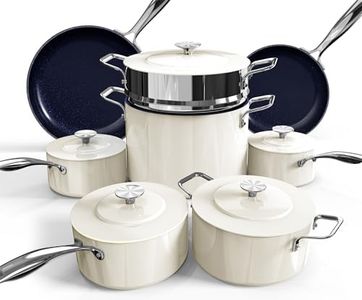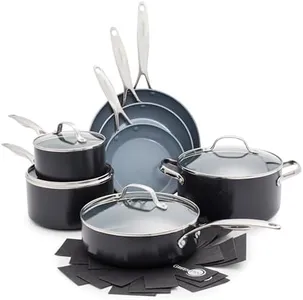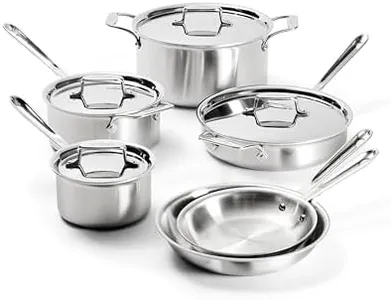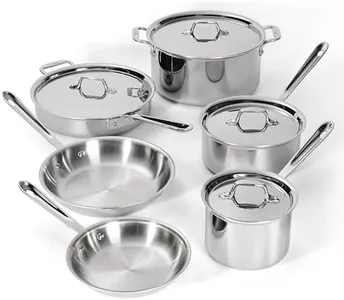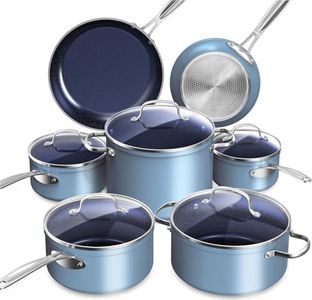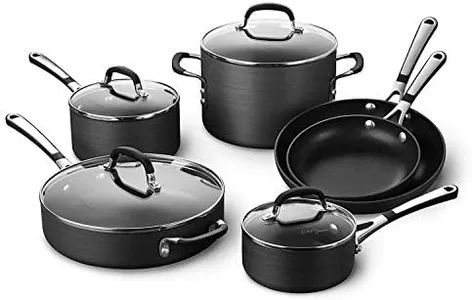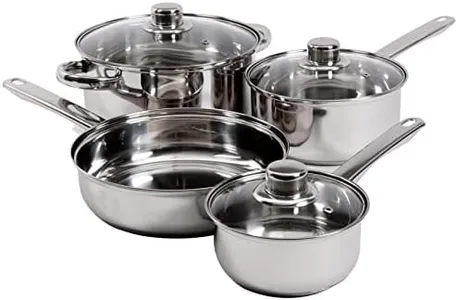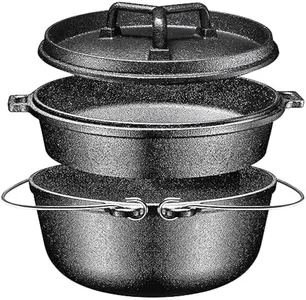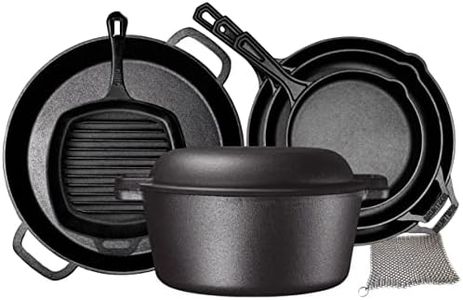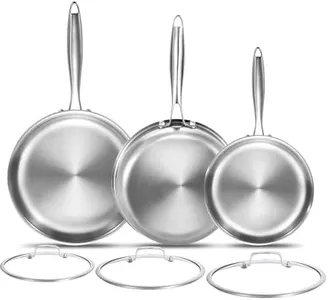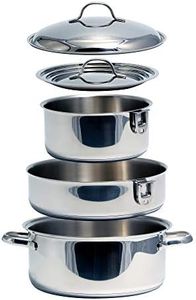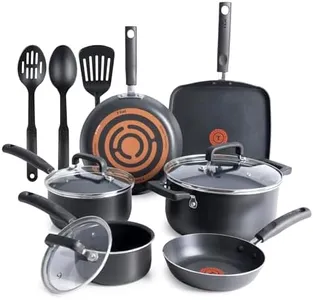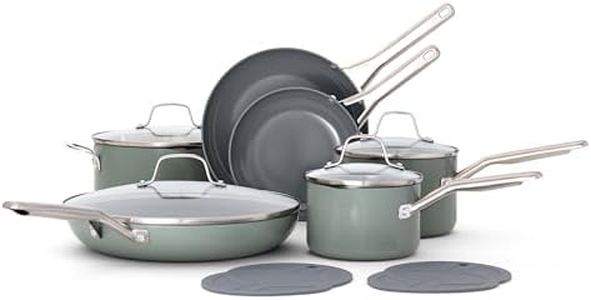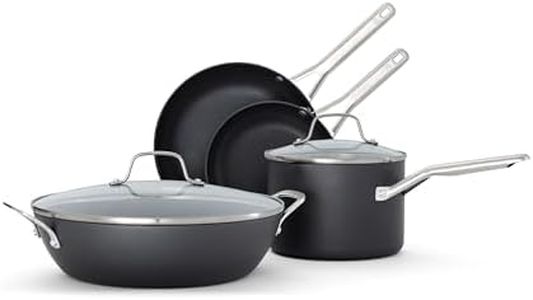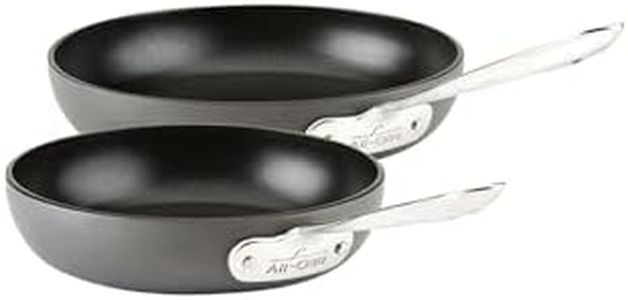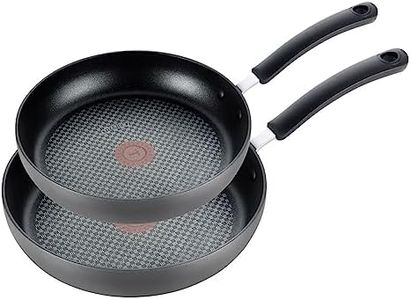10 Best Non Scratch Cookware 2026 in the United States
Our technology thoroughly searches through the online shopping world, reviewing hundreds of sites. We then process and analyze this information, updating in real-time to bring you the latest top-rated products. This way, you always get the best and most current options available.

Our Top Picks
Winner
GreenPan Valencia Pro Ceramic Nonstick 11 Piece Cookware Set, Hard Anodized PFAS-Free Pots & Pans, Induction Ready, Compatible on All Cooktops, Dishwasher Safe, Oven Safe to 600F, Gray
Most important from
2733 reviews
The GreenPan Valencia Pro Hard Anodized 11 Piece Cookware Set stands out with its ceramic nonstick coating infused with diamonds, offering excellent durability and being PFAS-free, PFOA-free, and free from other harmful substances like lead and cadmium. This ensures safe cooking and peace of mind. The hard anodized bodies are robust and scratch-resistant, which is ideal for non-scratch cookware needs. Additionally, the Magneto induction bases make these pans compatible with all cooktops, including induction, providing versatility for various cooking setups.
The set is also oven safe up to 600°F (lids up to 425°F), which adds to its functionality for different cooking methods. Glass lids are a thoughtful touch, allowing you to monitor cooking progress easily. The stainless steel handles are designed to stay cool and provide comfort during use. Heat conductivity is balanced, meaning your food cooks evenly, which is a major plus for any cookware.
Cleanup is straightforward as most messes wipe clean effortlessly, and being dishwasher safe further simplifies maintenance. However, the weight of the set (10.65 pounds) might be a bit heavy for some users, and the higher price point could be a drawback for budget-conscious buyers. This set would be particularly beneficial for those seeking durable, versatile, and safe cookware that performs well across various cooking conditions.
Most important from
2733 reviews
All-Clad D5 Brushed 5 Ply Stainless Steel Cookware Set 10 Piece w/ Frying Pans, Pots and Pans Set, Induction, Oven Broiler Safe 600F, Silver
Most important from
1268 reviews
The All-Clad D5 Stainless Steel Set is a premium 10-piece cookware collection that excels in heat distribution and versatility, making it a solid choice for home cooks looking for reliable, durable performance. Its 5-ply construction ensures consistent heating, which prevents hot spots and promotes even cooking. This feature is particularly beneficial for those who enjoy sautéing or simmering, as it helps achieve great results without burning food. The collection includes a variety of essential pieces, including fry pans, saucepans, a sauté pan, and a stockpot, catering to diverse cooking needs.
One of the standout features is its compatibility with all cooktop types, including induction. This allows versatile use across different kitchen setups, which is a significant plus for anyone who may change cooktops or move. The cookware is also oven and broiler safe up to 600°F, adding to its versatility.
In terms of drawbacks, while the All-Clad D5 is dishwasher safe, handwashing is recommended to maintain its finish. The set's weight, at 24 pounds, may feel heavy for some users, especially when handling larger pots or during storage. Additionally, as stainless steel cookware, it may require more attention to prevent food from sticking, compared to traditional non-stick pots and pans. Thus, users must be comfortable with cooking techniques that ensure food release. The elegant design also enhances kitchen aesthetics, making it a desirable choice for those who value both function and style. However, the investment may be higher than some budget options, which could deter casual cooks or those just starting out in the kitchen.
The All-Clad D5 Stainless Steel Set is an excellent option for serious home cooks seeking durable, versatile cookware that offers excellent heat conductivity and compatibility with various cooking surfaces. It is well-suited for anyone looking to elevate their cooking experience, provided they are willing to invest in quality kitchenware.
Most important from
1268 reviews
All-Clad D3 Stainless Steel Cookware Set - 10-Piece Pots and Pans Set, Induction, Oven Broiler Safe 600F - Includes Frying Pans, Saucepan, Sauté-Pan, Stockpot, Professional Cookware - Stainless Steel
Most important from
1744 reviews
The All-Clad D3 3-Ply Stainless Steel Cookware Set is a high-quality kitchen essential that shines in the non-scratch cookware category. One of its biggest strengths is the tri-ply construction, which ensures excellent heat distribution and retention, making cooking a breeze. The set includes a variety of pots and pans, catering to different cooking needs, and is compatible with all stovetops, including induction. So, whether you're sautéing, frying, or making sauces, this set performs well across the board.
The stainless steel material not only offers durability but also provides a polished finish that looks great in any kitchen. It has the ability to sear food perfectly and includes a lifetime warranty, adding an extra layer of trust in its longevity. Additionally, this cookware is oven and broiler safe up to 600°F, allowing for versatile cooking methods.
There are a few drawbacks to consider. First, the set is relatively heavy, weighing in at 26 pounds, which might be cumbersome for some users to handle, especially when full. While it is dishwasher safe, handwashing is recommended to maintain the cookware's appearance and longevity. Stainless steel requires a bit more care to avoid sticking, especially if not using enough oil or if cooking at the wrong temperature.
